When we think of Irritable Bowel Syndrome patterns, we typically think of diarrhea vs constipation.
So, what are you faced with currently? Diarrhea? Constipation? Or maybe a little bit of both?
There are many symptoms of IBS (Irritable Bowel Syndrome), but perhaps most notable are infrequent bowel movements that consist of diarrhea and/or constipation.
And while people of all ages can and do experience both diarrhea and constipation, here is something interesting you might not have known,
While women are still living longer than men, the National Institute for Health states that, “Women are up to two times more likely than men to develop IBS. People younger than age 50 are more likely to develop IBS than people older than age 50.”
I want to spend the time breaking diarrhea vs constipation down today to help give you a better understanding of different IBS patterns.
Note: Much of the diarrhea vs constipation information below comes directly from A Gutsy Girl’s Bible: a 21-day approach to healing the gut. Grab your physical copy on Amazon HERE to get started with your gut-healing journey *and/or* grab the instant PDF download of the book right now.
Diarrhea vs Constipation {Irritable Bowel Syndrome Patterns}
Click HERE to save diarrhea vs constipation for later.
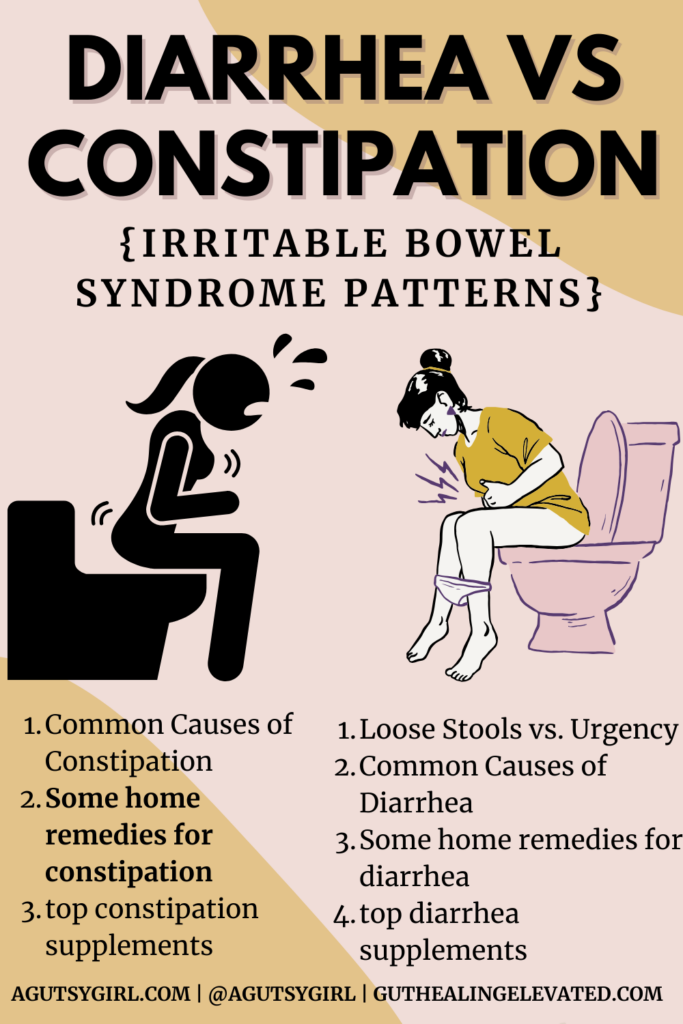
To get started, when it comes to IBS symptoms, everyone is different.
Some have the IBS-C (constipation) version, others have the IBS-D (diarrhea) version, and still others have the alternating version, which includes both constipation and diarrhea.
But in general, IBS symptoms typically include:
- abdominal pain
- constipation
- diarrhea
- both constipation and diarrhea, alternating
- gas
- bloat
- mucus in stool
Some common terminology you’ll see people use when it comes to the bowel habits of constipation and diarrhea:
- IBS/D (C): Irritable Bowel Syndrome / Inflammatory Bowel Disease (Constipation-dominant)
- IBS/D (D): Irritable Bowel Syndrome / Inflammatory Bowel Disease (Diarrhea-dominant)
- IBS/D (M): Irritable Bowel Syndrome / Inflammatory Bowel Disease (Mixed, alternating between constipation and diarrhea)
Let’s break both diarrhea vs constipation down in detail.
Constipation
Chronic constipation is infrequent bowel movements or difficult passage of stool that persists for several weeks or longer.
Constipation typically occurs with fewer than three bowel movements a week.
Constipation would be a 1 to 3 on the Bristol Stool Chart.
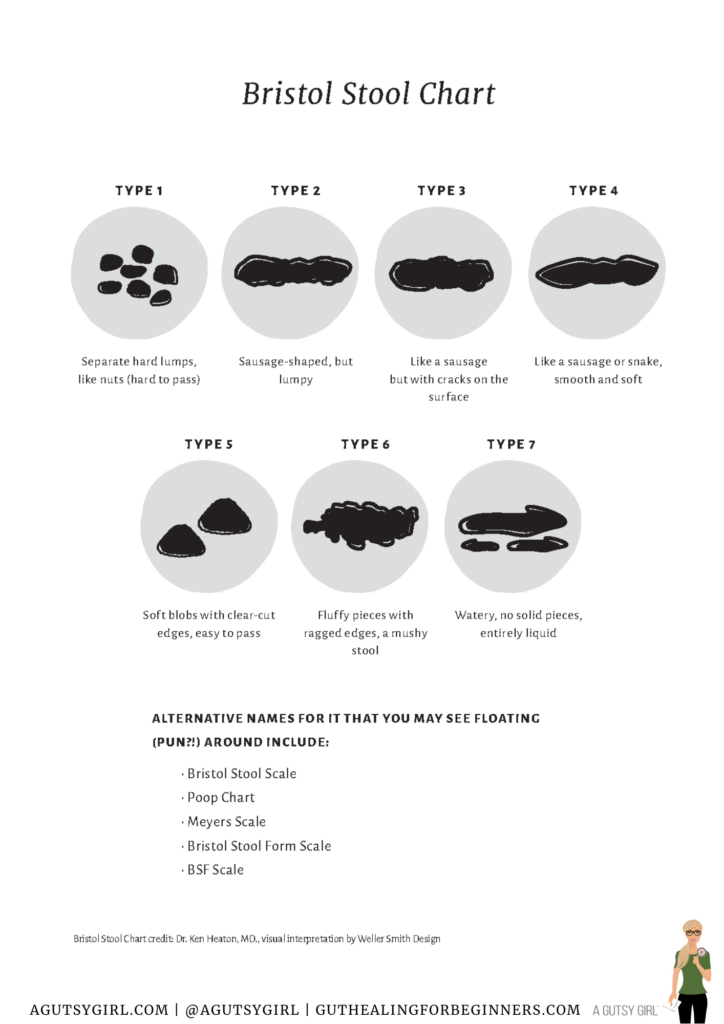
Common Causes of Constipation
Here are 10 common constipation causes:
- Most constipation occurs when the large intestine removes too much water from the stool. This makes the stool hard and challenging plus painful to eliminate.
- Stress. Stress activates the sympathetic nervous system which turns off the body’s “rest and digestion” function. This makes it even more difficult to digest and mobilize food in the GI tract.
- Hypothyroidism
- SIBO (Small Intestinal Bacterial Overgrowth)
- Abdominal adhesions
- Gastroparesis secondary to insulin resistance
- Standard American Diet
- Eating disorders
- Certain medications
- Laxative abuse / pain-killer abuse
(a lot of the above information was in conjunction with Dr. Tyler Jean)
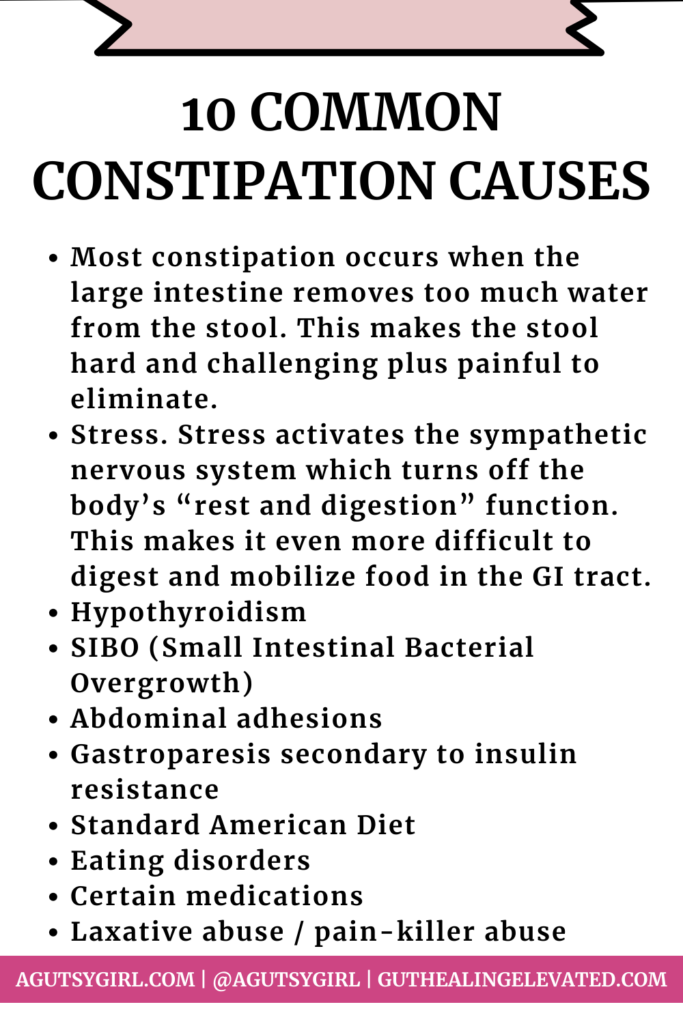
Some home remedies for constipation
Here are 11 easy things you can try at home for constipation.
- Ensure you are eating enough gelatinous, high-protein meats and fats, such as liver, and less muscle meats, like boneless, skinless chicken breast. Avoid high-protein dairy, which can aggravate constipation.
- Adequate hydration
- Drink lots of juice made from high-magnesium fruit and vegetables, such as oranges, celery, apples, carrots, cabbage, beets, and greens.
- Enough fiber (but keep in mind that it will need to be the right type of fiber for the situation at hand – read: Soluble vs. Insoluble Fiber HERE)
- Daily movement – light, not intense exercise
- Chew your food 30-40 times prior to swallowing
- Practice mindful eating
- Abdominal massage
- Stimulate the Vagus Nerve
- Drink Ginger tea (this one is simple to DIY, too – fresh ginger + hot water)
- Place it on your calendar. Okay, not literally, but this might be my #1 tip. You’ll hear me talk all about it in the YouTube video below via my Constipation Hack Series.
Extra note on food from A Gutsy Girl’s Bible: a 21-day approach to healing the gut:
While the specific foods may vary from one type of IBS/IBD to the other, fundamentally you can heal both in the same way: by focusing on both diet changes and lifestyle changes. If you are following this 21-day plan carefully and eating top-quality, unprocessed foods, most of your diarrhea and constipation will naturally improve.
Top 6 Constipation Supplements
And of course I would be remiss to not mention supplements that can help with constipation.
I have far more than 6 that I think can be very useful, but I’ll stick with the short list here.
- Magnesium. There are many forms of magnesium, and you can learn all about them HERE. The ones for constipation, though, include: citrate, oxide, sulfate.
- Prokinetic. Prokinetics include everything from ginger to triphala and even prescribed medications. I put together a list of prokinetics for consideration HERE.
- CBD Oil. According to the post highly-regarded nutritionist Ashley Koff wrote, CBD for Digestion, “If you suffer from IBS-C, then, CBD oil might be for you. According to Ethan Russo, cannabis researcher and physician, endocannabinoid deficiency may contribute to IBS, thus full spectrum hemp-derived CBD or a CBD / THC blend may help prevent or address IBS symptoms.” You can learn more about the Endocannabinoid System HERE.
- Apple Cider Vinegar (ACV). There are various reason for why ACV can help with constipation. Here is the reason I love most, “The high level of acidity acts as a natural laxative by stimulating the colon into peristalsis (muscle contractions that move waste through the colon).” You can learn more about this + grab my fave ACV HERE.
- Epsom Salt
- Vitamin C
While it’s not a supplement, THIS is the constipation alternative (to MiraLax) I recommend.
By the way, I have an entire Constipation Hack Series on YouTube.
If you’re interested in binge-watching, start here:
Diarrhea
The opposite of constipation is diarrhea.
In most cases, diarrhea lasts a couple of days. But when diarrhea lasts for weeks, it can indicate a serious disorder, such as a persistent infection, inflammatory bowel disease, or a less serious condition, such as irritable bowel syndrome.
Going back to the Bristol Stool Chart, diarrhea would be in the range of a 5 to 7 (mostly a “7”).
Loose Stools vs. Urgency
Around minute 12 of a podcast episode I recorded with Isabel Smith all about diarrhea, she talks about the difference between having a loose stool and
If you poop and it’s loose, then we are going to approach it in a certain way. But if you’re like oh-my-God I’m going to poop my pants or when you gotta go, you gotta go, then that’s typically different and has a different etiology.
Isabel Smith, Episode 28 of the A Gutsy Girl podcast
By the way, the whole podcast episode is chock full of fantastic information surrounding chronic diarrhea, frequency of bowel movements, stool consistency and more.
Common Causes of Diarrhea
Below you will find more severe causes of diarrhea, but these are some of the everyday causes:
- Lactose Intolerance. Lactose intolerance can cause various symptoms, including bloating, diarrhea, and abdominal cramps. It is the body’s inability to digest lactose, the main carbohydrate in dairy products. People with lactose intolerance don’t make enough of the enzyme lactase, which is needed to digest lactose. Dairy is one tricky devil, though. Be sure to review my list of 100 dairy sources and alternate names.
- General food intolerance. And remember, a food intolerance is different from a food allergy. The intolerance can manifest symptoms up to around 72 hours after consuming the offensive food.
- Alcohol
- Medications
- Abusing laxatives and/or stimulants
- Viral infection
- Food poisoning or other bacterial infections
- Hyperthyroidism
- Malabsorption (occurs a lot with a leaky gut)

Get instant access to the Master Gut Healing resources; all the tools you need for healing your gut!
Some home remedies for diarrhea
Here are 8 easy things you can try at home for diarrhea.
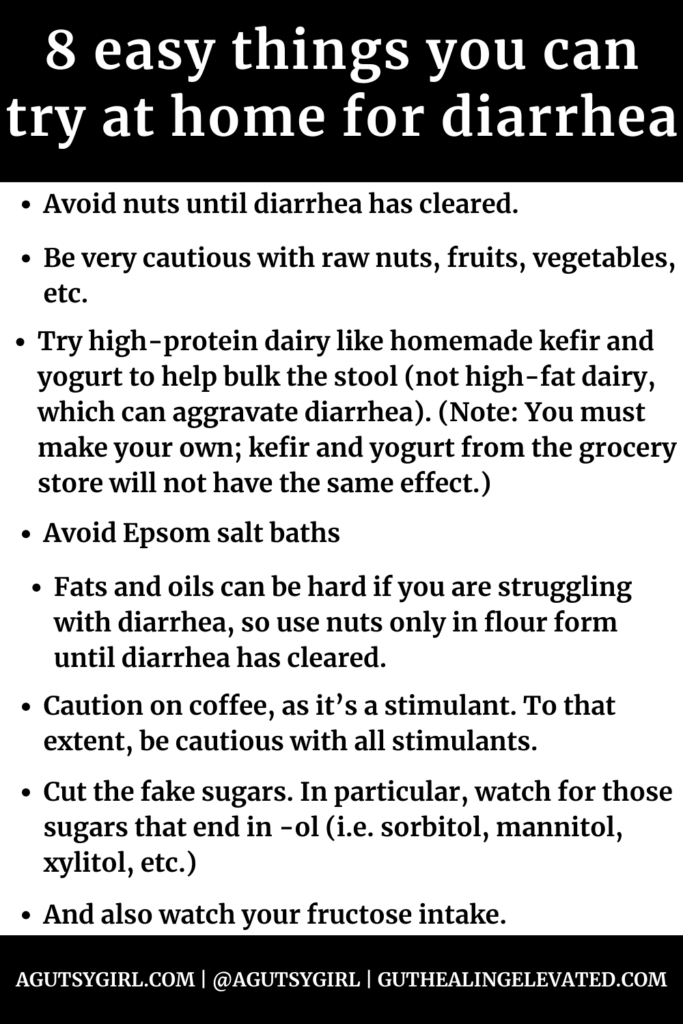
- Avoid nuts until diarrhea has cleared.
- Be very cautious with raw nuts, fruits, vegetables, etc.
- Try high-protein dairy like homemade kefir and yogurt to help bulk the stool (not high-fat dairy, which can aggravate diarrhea). (Note: You must make your own; kefir and yogurt from the grocery store will not have the same effect.)
- Avoid Epsom salt baths.
- Fats and oils can be hard if you are struggling with diarrhea, so use nuts only in flour form until diarrhea has cleared.
- Caution on coffee, as it’s a stimulant. To that extent, be cautious with all stimulants.
- Cut the fake sugars. In particular, watch for those sugars that end in -ol (i.e. sorbitol, mannitol, xylitol, etc.)
- And also watch your fructose intake. More on fructose HERE.
Top 3 Diarrhea Supplements
Here are 3 supplements to inquire with your practitioner about for diarrhea. This list is very small because when it comes to diarrhea, I think you should focus on less vs. more.
- Berberine. Clinical studies with isolated berberine have shown significant success in the treatment of acute diarrhea, irritable bowel syndrome, type 2 diabetes, high blood pressure, elevated blood lipids, Alzheimer’s disease and cancer. In particular, Berberine may be an effective way to manage symptoms of IBS-D.
- Probiotic. Many agree that probiotics are great for improved floral balance, which reduces the chances for diarrhea. I urge you to understand probiotics by reading THIS.
- L-Glutamine. L-glutamine is the most plentiful amino acid in the body and supports intestinal health. It may work for those with IBS because of this role. According to Dr. Amy Myers, “People with IBS that is stress induced may find that increasing their intake of L-Glutamine mitigates the impact of cortisol, improving muscle function and helping your body resolve spasms.”
Severe Digestive Problems (beyond the common conditions above)
If and when you are presented with any severe symptoms ; severe constipation and/or persistent diarrhea, especially with rectal bleeding that accompanies, you must always seek out a healthcare provider for special medical treatment.
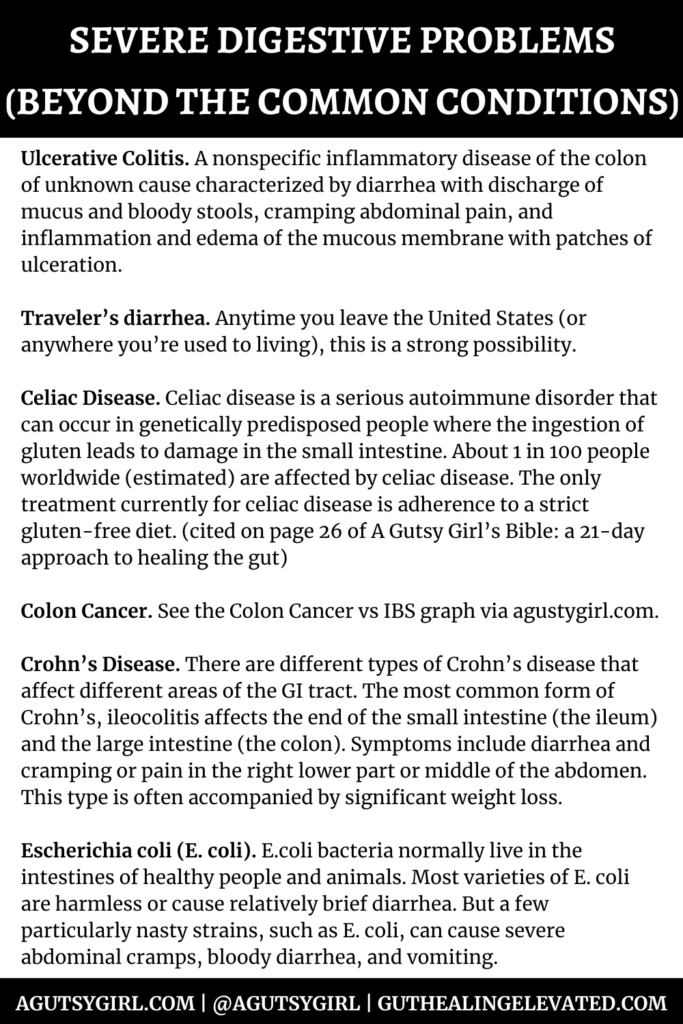
Here are some of the health conditions that could be associated with the above.
- Ulcerative Colitis. A nonspecific inflammatory disease of the colon of unknown cause characterized by diarrhea with discharge of mucus and bloody stools, cramping abdominal pain, and inflammation and edema of the mucous membrane with patches of ulceration.
- Traveler’s diarrhea. Anytime you leave the United States (or anywhere you’re used to living), this is a strong possibility.
- Celiac Disease. Celiac disease is a serious autoimmune disorder that can occur in genetically predisposed people where the ingestion of gluten leads to damage in the small intestine. About 1 in 100 people worldwide (estimated) are affected by celiac disease. The only treatment currently for celiac disease is adherence to a strict gluten-free diet. (cited on page 26 of A Gutsy Girl’s Bible: a 21-day approach to healing the gut)
- Colon Cancer. See below for a graph of Colon Cancer vs IBS.
- Crohn’s Disease. There are different types of Crohn’s disease that affect different areas of the GI tract. The most common form of Crohn’s, ileocolitis affects the end of the small intestine (the ileum) and the large intestine (the colon). Symptoms include diarrhea and cramping or pain in the right lower part or middle of the abdomen. This type is often accompanied by significant weight loss.
- Escherichia coli (E. coli). E.coli bacteria normally live in the intestines of healthy people and animals. Most varieties of E. coli are harmless or cause relatively brief diarrhea. But a few particularly nasty strains, such as E. coli O157:H7, can cause severe abdominal cramps, bloody diarrhea, and vomiting.
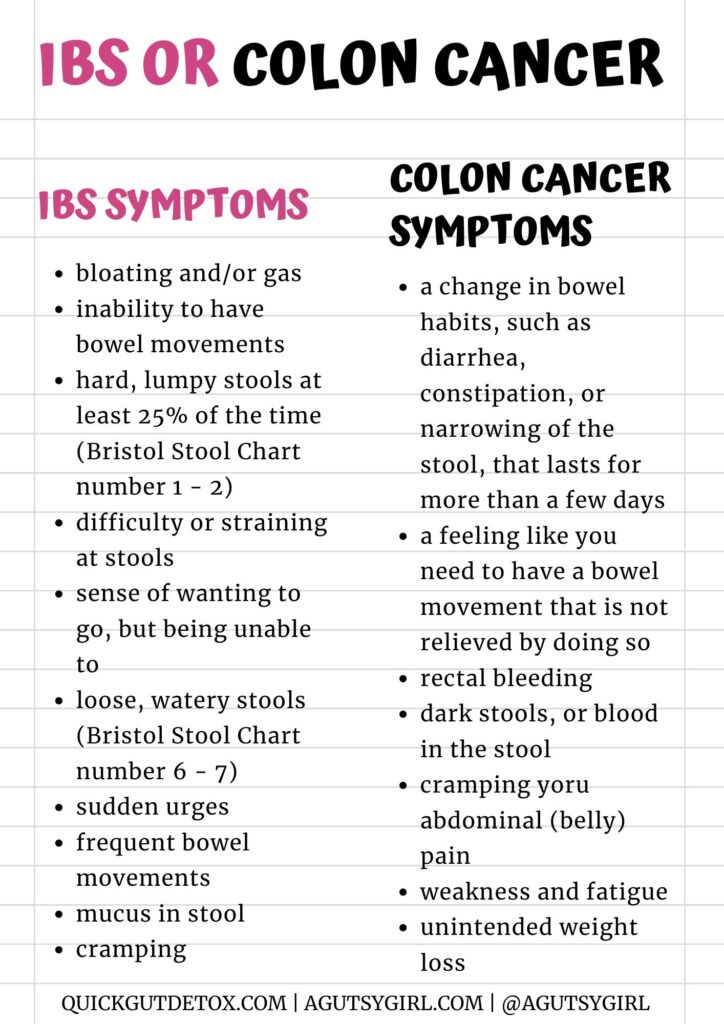
Want to HEAL? Truly HEAL?
BTW – When I finally healed myself once and for all, it was because I had learned the value and power of answering to myself.
It’s not easy to hear, but the reality is that when you are silently suffering with gas, bloat, and diarrhea, no one cares as much as you do.
In fact, others may not even believe you or give you the time of day for complaining.
You will have no one to answer to on this 21-day journey but yourself.
If you want to heal, uncover answers, and live a healthier and happier life, I’m INVITING YOU to join Gut Healing: ELEVATED. Watch your life change!
Diarrhea vs Constipation: Universal Thoughts
With both/either/or diarrhea vs constipation there are different ways to approach the digestive system.
Here are 7 universal things I might recommend / thoughts I have:
- Do not become dependent upon over-the-counter medications.
- Drink plenty of water. It’s always, no matter what, a good idea to drink plenty of pure water.
- Blood tests. Get them if you need them, any and all that are recommended to you.
- Stool sample. This is one testing option that is always overlooked (but stop overlooking it!) for two main reasons:
- Western practitioners typically never do them.
- You think it will be “too gross” to collect.
- What is the underlying cause? See below. IBS is BS. Get yourself in check and do a Root Cause Analysis.
- Ensure a balanced diet. I cannot emphasize this one enough. It’s been beaten down, but I still have to keep beating it more. Because it’s critical.
- Fast. No matter your thoughts on meal spacing and/or intermittent fasting, believe me that both can and should probably have a place on your plan for either/both constipation and diarrhea. The art of fasting changed my life!
IBS is BS
Finally, what I want you to always remember about IBS is that it’s sort of BS.
Yes, I said it; BS. IBS is a collection of symptoms.
Regardless of whether it’s constipation or diarrhea-dominant, you must keep seeking answers for why it’s there to begin with.
Let me know in the comments below if you have any questions!
If you liked this post, you might also enjoy:
- 13 Best Paleo Bars {that are also high protein}
- Soluble vs Insoluble Fiber
- 16 Things to Know About Coconut Flour
Xox,
SKH
🤰 bloating be gone! weight loss through optimal gut health for women
💃ʜᴇᴀʟ ʏᴏᴜʀ ɢᴜᴛ. ʜᴇᴀʟ ʏᴏᴜʀ ʟɪfe.
🫶🏻 founder gutbyome.com

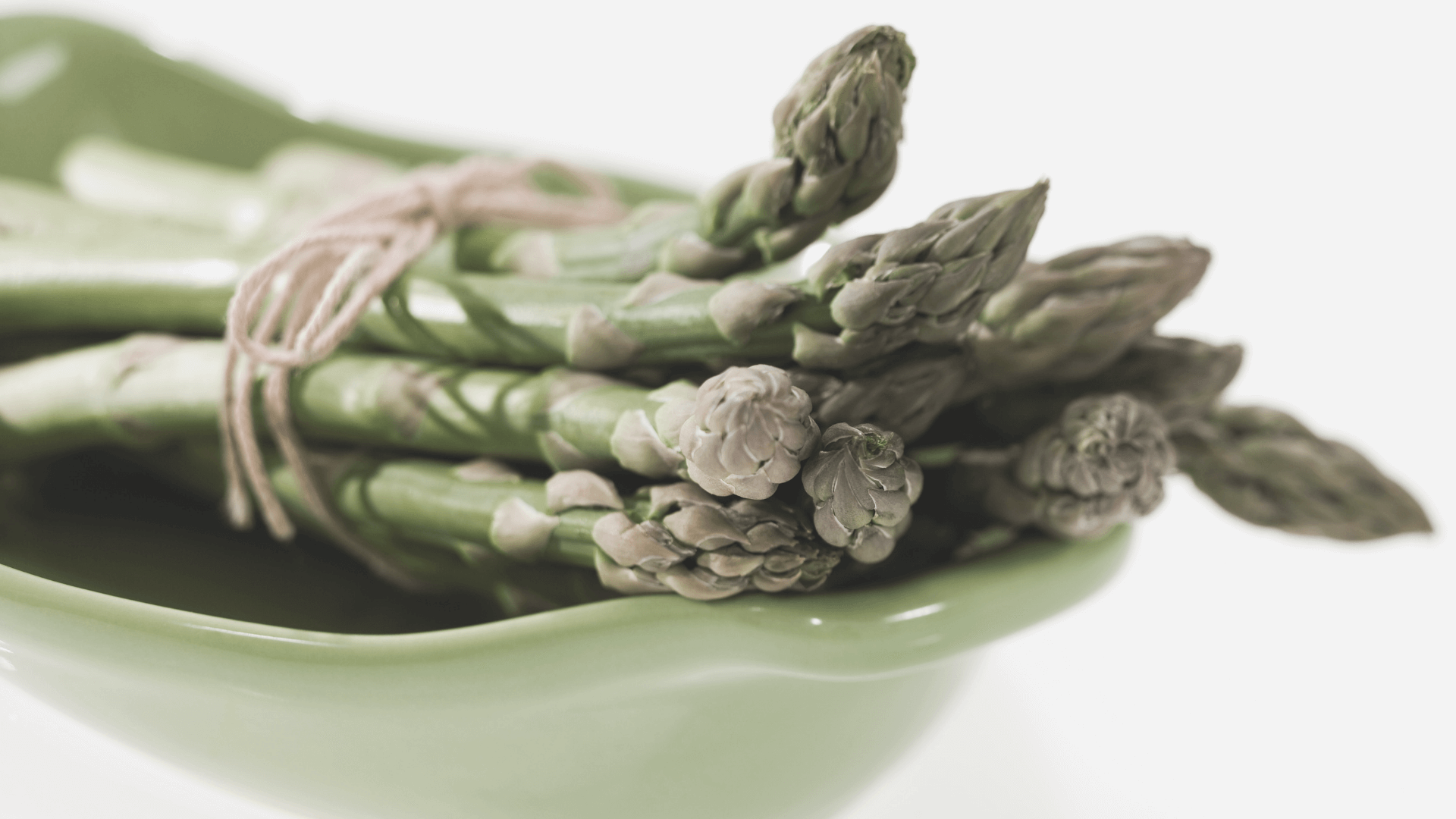
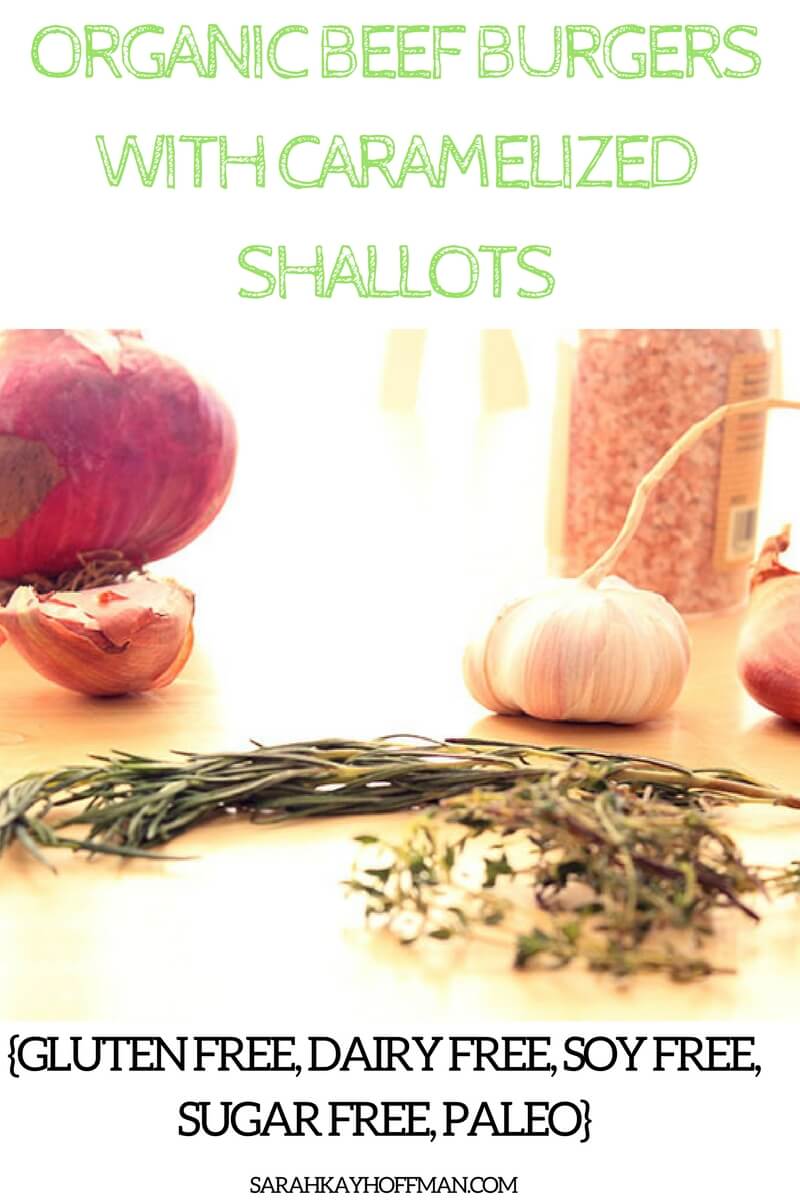

![Healing from Trauma [for overall healing]](https://agutsygirl.com/wp-content/uploads/2021/02/episode-4-podcast-featured-agutsygirl.com_.png)
![Lyme Disease Diet [All About Lyme, Episode 62 with Dr. Jess Peatross]](https://agutsygirl.com/wp-content/uploads/2022/11/ep-62-jess-peatross.png)
![Gluten Free Lemon Chicken Recipe [Slow Cooker]](https://agutsygirl.com/wp-content/uploads/2022/12/drummies-featured.png)